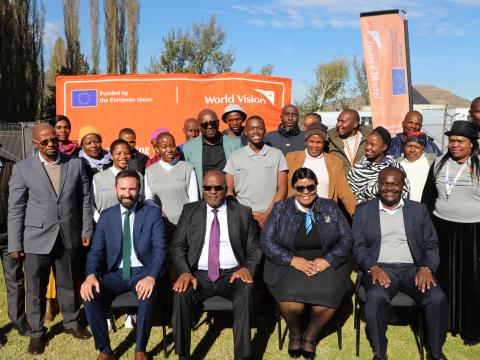Humanitarian Advocacy and Disaster Reduction and Management

Remarks by: Mr. James Nkemba Chifwelu , World Vision Lesotho National Director
His Majesty King Letsie III
The Right Honorable Prime Minister
Cabinet Minister present here with us today- Hon. Minister in the Prime Minister’s Office, Hon. Limpho Tau
EU head of delegation - Mario
UN agencies
Representatives from different NGO’s
Community and children representatives
Ladies and Gentlemen
It is with great honor and privilege on behalf of World Vision International Lesotho to be partnering with the Government of Lesotho, development partners, Non-Governmental Organizations, the private sector and communities towards ‘Strengthening National and Community Capacities for effective Disaster Preparedness and Crisis Response in Lesotho’.
I would like to give special cognizant to the European Union Humanitarian Aid Operations for provision of funding in assistance to countries and populations affected by disasters embodying the principle of solidarity.
World Vision as an organization believes in a world where children, families and communities are safe from disaster and when disaster strikes, whether natural or manmade, we want communities to be better prepared and adequately equipped to respond to and bounce back from all kinds of shocks caused by disaster.
In Lesotho, World Vision has been operational since 1987 partnering with children, families and their communities to help them reach their full potential by tackling the causes of poverty and injustice through its integrated programmes implemented in 14 area programmes in 8 districts of Lesotho.
- Advocacy: amplifying voices, especially those of children. Harnessing them to call for what is right, fair and just.
- Child Protection & Participation: ensuring safe and secure childhoods where children have the right to express themselves freely.
- Clean water, sanitation & hygiene: ensuring children and their families to live healthy, prosperous lives with access to clean and safe drinking water.
- Health, HIV & Nutrition: ensuring mothers and children are healthy and well nourished.
- Livelihoods & Resilience: breaking the cycles of poverty.
- Humanitarian Emergency Affairs: helping children, families and communities survive crisis
Today, in solidarity for the benefit of the most vulnerable in Lesotho we are meeting under the auspices of the European Union Humanitarian Aid Operations funded project “Disaster Risk Reduction” dubbed ECHO. The project started its implementation in 2018 and has been implemented in the districts of Thaba-Tseka, Mokhotlong, Qacha’s Nek and Leribe reaching over 40 000 beneficiaries to-date capacitating them to mitigate, prepare and respond to disasters in their respective areas.
As part of the global community, we too are playing an active role in adapting to the effects of climate change which has brought forth erratic weather patterns which affect livelihoods & resilience and food security worldwide and leaving the already vulnerable families worse off. The Disaster Risk Reduction project has intentionally targeted beneficiaries in hardest to reach areas in Lesotho in line with our strategy “Leaving No One Behind”.
Through today’s dialogue, we wish for all stakeholders to evaluate on their overall preparedness for any foreseeable or un-forceable hazard, shock and disaster. The Lesotho Meteorological Services has already forecasted that from October to December 2023, there is a high probability of droughts due to the El Nino, this is an opportunity for us to collaborate with children and community members from hard-to-reach areas from Mokhotlong, Thaba-Tseka and Leribe in charting a ay way forward on sustainable strategies and approaches to ‘Strengthening National and Community Capacities for effective Disaster Preparedness and Crisis Response.’
World Vision International, Lesotho strategy seeks to enhance collaboration with government and relevant stakeholders to ensure that the government reaches and fulfills its planned-out targets on the Lesotho National Disaster Risk Reduction Strategy and Action Plan 2020-2030.We can remember that The Strategy and Action plan is a result of ratifying the Sendai Framework 2015-2030 as one of the international treaties ratified by the government of Lesotho.
To date the Disaster Risk Reduction project has:
- responded to the food insecurity stated by the Lesotho Vulnerability Assessment Committee’s report from 2021 through the distribution of ‘cash transfers’ targeting 19 000 community members for the past 3 months to ensure that Basotho children get the required nutritional needs.
- contributed towards the Sustainable Development Goal 13 to “Take urgent action to combat climate change and its impacts” in particular on preparedness and risk reduction.
Reducing disaster risks and preparing for any disasters, is our collective responsibility. Let us rally together to protect children from the harsh realities of climate change. There is hope.
With the support of our partners, we are in a better position to respond to the pressing and ever-changing needs of children in Lesotho, especially the most vulnerable children in Lesotho’s hardest to reach places.
Ladies and gentlemen allow me to conclude by indicating the key issues to be discussed during the event as follows:
- Enactment of the Disaster Risk Reduction and Management Bill of 2020 into law with thorough public consultations done.
- Review of the National Information System for Social Assistance (NISSA) to ensure the most vulnerable receive the help they need most. This will assist in cases of any humanitarian need that plans can be enforced and if need be, assistance be well coordinated.
- Inclusion of disaster-risk reduction courses or subject into the curriculum as well as ensuring that all schools are conscious of the common hazards and shocks in their areas and are well prepared against such.
- Resource mobilization in-line with the Sendai Framework which was ratified by the government of Lesotho. Support needed to ensure effective implementation of National Disaster Risk Reduction Strategy and Action Plan.
Ke ea Leboha
Khotso.Pula.Nala